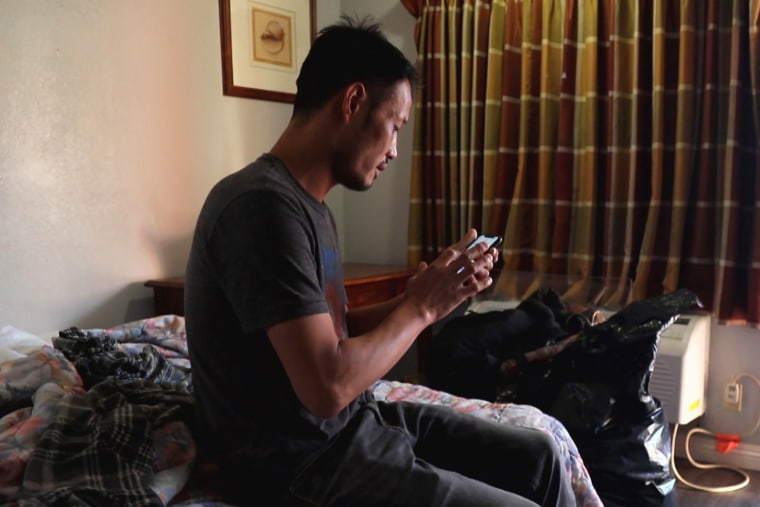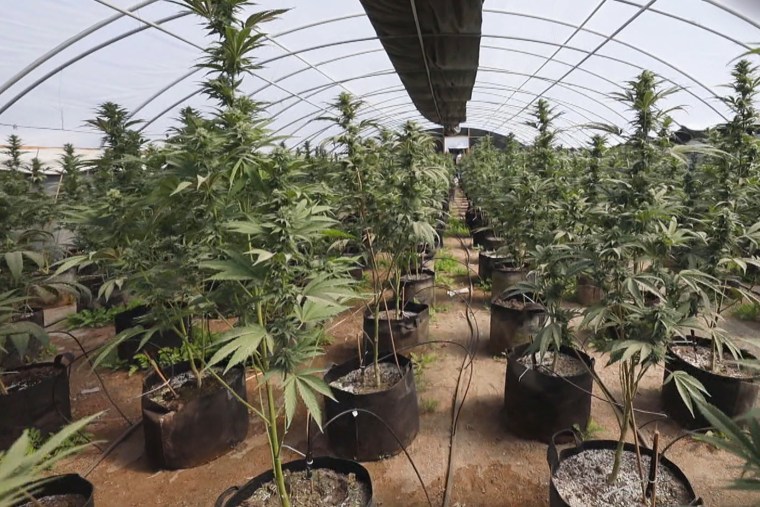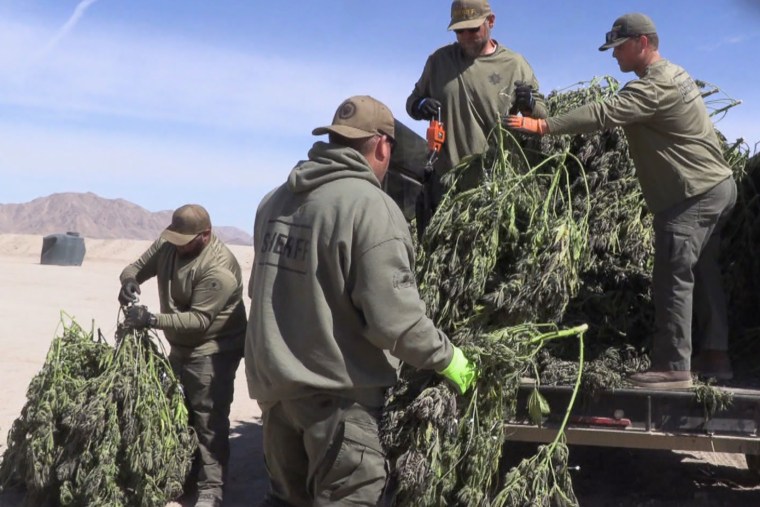
Raids on black market cannabis farms uncover human trafficking victims
MOJAVE DESERT, Calif. — As more states legalize cannabis, law enforcement officials say they are seeing an uptick in black market operators using suspected human trafficking victims to grow and trim marijuana sold in legal dispensaries.
But authorities and advocates say helping these victims can be complicated because many don't admit to being trafficked and are unwilling to work with law enforcement agencies to take down smugglers and dealers.
Nine of those suspected victims were arrested during an early morning raid in May in California's Mojave Desert. The cannabis workers, all Chinese nationals who had traveled from New York, attempted to flee as law enforcement officials executed a search warrant on the secluded farm.
Speaking through a Mandarin translator, one woman said she found the job through a Chinese website. Some listings reviewed by NBC News did not mention specific salaries, and others said they could be negotiated in person.
“I have no money. What hope do I have?” said a worker named Jin, who asked to be identified only by his first name.

All the workers apprehended said they had previously been employed in restaurants before making the trek west; several said they were eager to return to relatives on the East Coast. None had been paid for their labor and they were living in cramped, uncomfortable trailers near the illegal grow operation.
A worker named Fang, who also asked to be identified only by her first name, said she left her 8-year-old son behind in New York.
“It’s very dirty, it’s very messy,” she said of the trailer where she had been sleeping.
When asked if she had been told the truth about the kind of work she would be undertaking, Fang said no.
Fang, Jin and the other workers were charged with misdemeanors and later released, according to the San Bernardino County Sheriff’s Department. The workers had been tending to 25 greenhouses, where law enforcement officials said they recovered about 1,000 pounds of processed marijuana. The facility likely generated $8 million in revenue quarterly, officials said.
None of the workers said they had been trafficked, but law enforcement officials said they suspected otherwise.
"It's common for them to not give up any information on their trafficker, to tell us that they feel safe, because, ultimately, we believe they're in fear of their own safety if they say anything other than that to us," said Sgt. James Roy of the Riverside County Sheriff’s Department.
Attorney Xiaosheng Huang, who represents trafficking victims, said many of his clients were exploited during the pandemic after losing jobs in the hospitality industry. Desperate and owing money to the people who smuggled them into the United States, they sought employment anywhere they could find it, including illegal grow operations in California, Washington, Oklahoma and New Mexico.

In the last year alone, law enforcement officials in San Bernardino County have shut down nearly 1,100 illegal grow locations and more than 8,600 greenhouses, the sheriff’s department said in a statement. This includes seizing more than 1.4 million cannabis plants, 97 tons of processed marijuana and 175 pounds of concentrated cannabis with an estimated street value of $1 billion.
Other law enforcement investigations in Los Angeles and Riverside counties pushed illegal cannabis seizures in the last year to more than $1 billion, the California Department of Cannabis Control said in a recent statement.
“This important milestone was reached through close collaboration with local, state, and federal partners and furthers California’s efforts to go after activities that harm communities and the environment, including water theft, threats of violence, elder abuse, and human trafficking to name a few,” the department's director, Nicole Elliott, said in the statement.

California’s recreational cannabis program was created, in part, to curb the black market and weaken drug cartels’ stranglehold on the crop. But burdensome taxes and high costs of entry have created a crisis within the increasingly unstable market, which has been flooded in recent years by illicit growers and dealers selling their cannabis at cheaper prices.
Gov. Gavin Newsom eliminated the “cultivation tax” on growers earlier this year but counties will still be able to impose their own such tax, which many in the industry call the single most burdensome fee attached to growing marijuana legally.
A year ago, cultivators could get about $1,000 a pound wholesale, but with the market saturated and supply higher than demand, it has dropped to $300 or lower.
In many ways, California’s legalization push faced challenges from the start. The state’s illegal market had flourished for decades, stubbornly anchored in the “Emerald Triangle” of far Northern California. Driven by cartels from Mexico and China, the black market has since expanded to other parts of the state, including rural areas of Southern California.






